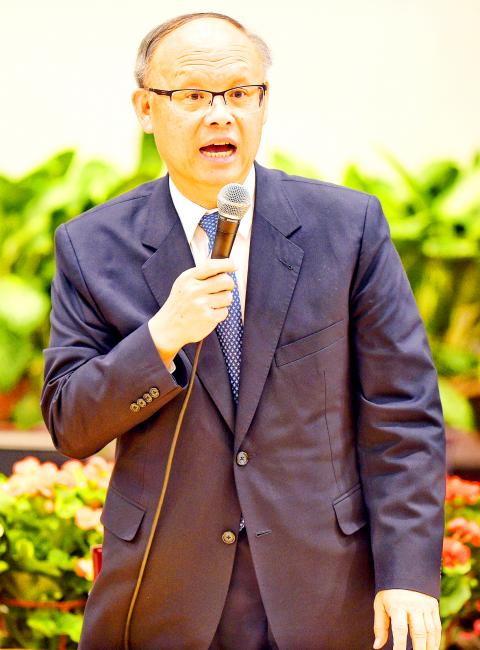Minister Without Portfolio John Deng (鄧振中), the nation’s top trade negotiator, yesterday said Taiwanese firms’ practice of exporting to the US products made of steel and aluminum from China was the reason that Taiwan has not been exempted from tariffs announced by Washington.
Deng, who is returning to Taiwan after leading a delegation to the US on Sunday last week to seek a tariff exemption, made the remark in a telephone interview with the Central News Agency.
The nation’s unsuccessful attempt to be included in the list of exemptions reflected Washington’s concerns that some Taiwanese firms import steel and aluminum from China and process them into finished goods before selling them to the US market, Deng said.

Photo: Chang Chia-ming, Taipei Times
US President Donald Trump’s tariffs seem to be aimed at curbing alleged dumping of Chinese steel and aluminum products in the US, he said.
Washington might be hoping to work with other nations to stop this situation, he added.
Deng said that after returning to Taiwan early today, he would meet with local exporters to map out a solution.
Despite the setback, he said the government would continue to try to convince the US to exempt Taiwan as a whole, while encouraging individual exporters to seek their own exemption.
The Ministry of Economic Affairs would provide assistance to individual firms that wish to seek an exemption, he added.
The temporary exemption list would not take effect until a formal notice is released by the end of next month, Deng said, adding that Washington welcomes other nations to enter into talks with its trade office for an exemption.
On March 8, Trump signed an order under Section 232 of the US’ Trade Expansion Act of 1962 to impose a 25 percent tariff on imported steel and a 10 percent tariff on aluminum.
The duties took effect on Friday.
It was the first time in more than three decades that the law has been invoked to protect a US industry from competition from imports.
On Friday, US Trade Representative Robert Lighthizer told a US Senate panel that Trump has decided to grant a temporary exemption to the EU, Canada, Mexico, Australia, Brazil, Argentina and South Korea as it carries out further negotiations with them.
However, the order signed by Trump leaves open a door to other nations that want to get tariff waivers, as long as they are able to offer a satisfactory alternative during talks with the Office of the US Trade Representative.
While in the US, Deng met with many US government officials and academics from major think tanks, as well as representatives from the business sector, which he said helped him gain a better understanding about the tariff issue.
Deng said he would report to Premier William Lai (賴清德) as soon as possible to discuss whether he will lead another delegation to Washington.
Taiwan’s steel product exports to the US totaled US$1.3 billion last year, accounting for 13.16 percent of the nation’s total exports, while aluminum product exports totaled US$44 million, or 6.15 percent of total aluminum exports, the ministry said
Last year, the US was the largest buyer of the nation’s steel products and the sixth-largest buyer of aluminum products, it said.

CHAOS: Iranians took to the streets playing celebratory music after reports of Khamenei’s death on Saturday, while mourners also gathered in Tehran yesterday Iranian Supreme Leader Ayatollah Ali Khamenei was killed in a major attack on Iran launched by Israel and the US, throwing the future of the Islamic republic into doubt and raising the risk of regional instability. Iranian state television and the state-run IRNA news agency announced the 86-year-old’s death early yesterday. US President Donald Trump said it gave Iranians their “greatest chance” to “take back” their country. The announcements came after a joint US and Israeli aerial bombardment that targeted Iranian military and governmental sites. Trump said the “heavy and pinpoint bombing” would continue through the week or as long

TRUST: The KMT said it respected the US’ timing and considerations, and hoped it would continue to honor its commitments to helping Taiwan bolster its defenses and deterrence US President Donald Trump is delaying a multibillion-dollar arms sale to Taiwan to ensure his visit to Beijing is successful, a New York Times report said. The weapons sales package has stalled in the US Department of State, the report said, citing US officials it did not identify. The White House has told agencies not to push forward ahead of Trump’s meeting with Chinese President Xi Jinping (習近平), it said. The two last month held a phone call to discuss trade and geopolitical flashpoints ahead of the summit. Xi raised the Taiwan issue and urged the US to handle arms sales to

State-run CPC Corp, Taiwan (CPC, 台灣中油) yesterday said that it had confirmed on Saturday night with its liquefied natural gas (LNG) and crude oil suppliers that shipments are proceeding as scheduled and that domestic supplies remain unaffected. The CPC yesterday announced the gasoline and diesel prices will rise by NT$0.2 and NT$0.4 per liter, respectively, starting Monday, citing Middle East tensions and blizzards in the eastern United States. CPC also iterated it has been reducing the proportion of crude oil imports from the Middle East and diversifying its supply sources in the past few years in response to geopolitical risks, expanding

Pro-democracy media tycoon Jimmy Lai’s (黎智英) fraud conviction and prison sentence were yesterday overturned by a Hong Kong court, in a surprise legal decision that comes soon after Lai was jailed for 20 years on a separate national security charge. Judges Jeremy Poon (潘兆初), Anthea Pang (彭寶琴) and Derek Pang (彭偉昌) said in the judgement that they allowed the appeal from Lai, and another defendant in the case, to proceed, as a lower court judge had “erred.” “The Court of Appeal gave them leave to appeal against their conviction, allowed their appeals, quashed the convictions and set aside the sentences,” the judges